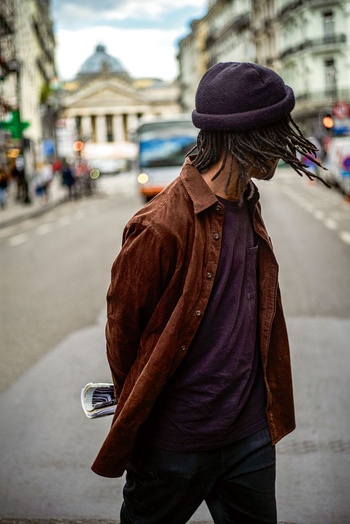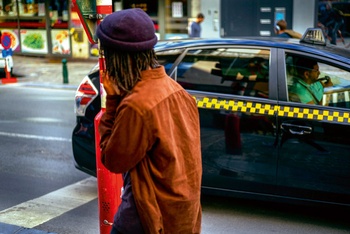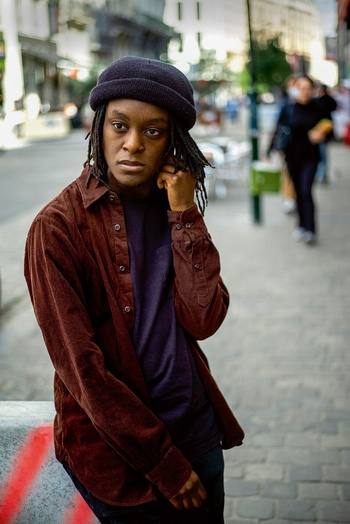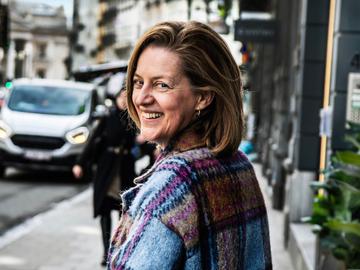With their first real poetry collection Surge, London writer Jay Bernard, currently in residence at Passa Porta, delved into a turbulent event in black history and returned with poetry for the future. Fearless, many-voiced, radically open, and ready to re-imagine society.
© Ivan Put
| Jay Bernard
WHO IS JAY BERNARD?
• Was born in 1988
• At 17 they are named a Foyle Young Poet of the year
• At 19 they publish their first pamphlet, Your Sign Is Cuckoo, Girl
• They publish English Breakfast in 2013
• In 2014 they become a programmer at BFI Flare, the London LGBTIQ+ film festival
• The Red and Yellow Nothing (2016) is nominated for the Ted Hughes Award
• Wins the Ted Hughes Award for the multimedia performance Surge: Side A
• Is elected as a Fellow of the Royal Society of Literature
• Publishes their first collection of poetry, Surge, in 2019 and is nominated for the TS Eliot Prize, the Costa Poetry Award, the Dylan Thomas Prize, and the RSL Ondaatje Prize
“What's a conclusion? Who comes to conclusions?” It is with a smile that London poet Jay Bernard reacts to the question of whether their (Jay Bernard uses the non-binary pronouns “they”, “them”, and “their”) six-week residency at Passa Porta is leading them to any insights into the fundamental questions about what it means to be a writer, but the questions we received in return are more than just jesting dismissals. There is a burning core in that unwillingness to place a full stop.
That core has many names. Fluidity. Layeredness. And “mutability”, as Jay Bernard describes the promise that poetry held for them. The capacity for change. “Poetry is a technical, challenging thing to do. It's cerebral, it's a lot of artifice, and at the same time it comes out of feeling. I like that, and I like that poetry is without home, so to speak. Theatremakers work in theatres, cinema happens in cinemas, but poetry is a very makeshift, vagabond kind of thing. I love the way that it makes you think about subjectivity, positionality, the way that it allows me to be so many things and take on so many voices.”

© Ivan Put
| Jay Bernard in the streets of Brussels
These voices displace something. At seventeen, they were named a Foyle Young Poet of the year, at nineteen they published their first poetry pamphlet, Your Sign Is Cuckoo, Girl, and in 2016 their The Red and Yellow Nothing was shortlisted for the Ted Hughes Award. That “techno-medieval misadventure”, featuring Sir Morien, the black son of a knight of the Round Table, threw a Middle Dutch poem (part of which is kept at the Royal Library of Brussels), various Arthurian tales, 15th century Scottish poet William Dunbar, and American rapper and producer Kendrick Lamar into an exuberant, exhilarating mix, ardently questioning issues of race, gender, and identity.
UNFINISHED AND ONGOING
In the meantime, Jay Bernard has won that Ted Hughes Award, for their 2017 performance piece Surge: Side A, which last year “culminated” in Surge, their first real collection of poetry, for which they were immediately nominated for the TS Eliot Prize, the Costa Poetry Award, the Dylan Thomas Prize, and the RSL Ondaatje Prize.
The collection grew out of the archives of the New Cross Massacre – when on 18 January 1981, thirteen black teenagers attending Yvonne Ruddock's 16th birthday party were killed in a house fire – a movable body with multiple identities that doesn't know, remembers, learns, belongs, detaches from, transforms into, and attaches to. A body (of work) in which black womanhood and queerness, objectivity and experience, history and memory, community and identity, taught and potential knowledge, speech and music, and dead and living enter into a dialogue. A dialogue that is critical, painful, heart-warming, sensual, radical, enraged, fissured, tactile, and fleeting. Like a balled paradox that ploughs through historical earth and thus becomes a vision of the future, of a kind of poetry that risks itself in all its fragmentariness, incompleteness, and liveliness, and turns the world upside down.
I wanted to come at history as a flawed, contradictory being in the 21st century
In other words, poetry that matters. That is fearless and so alive that it sometimes literally hurts. It is no surprise that Jay Bernard won the Ted Hughes Award. But that they won it for a performance, “something unfinished and ongoing”, was quite exceptional. “It was kind of a funny one because what exactly was being awarded here? And it's still not finished, there is more to come. (Laughs) To me, that's very 2020. You know, I wrote a show in October called My Name Is My Own, for six actors. Frightening, sure, but also really interesting. I think there is only going to be more of this in the future. This moving between stage and page, the poet's voice being fragmented, coming out of different bodies. I think that is going to be really necessary if what we're trying to do is re-imagine society.”
WHERE TO PUT THE BURNING HOUSE?
For Surge, that re-imagining started at the George Padmore Institute, “an archive, library, and research centre dedicated to radical black history in Britain”, where Jay Bernard did a residency and opened the boxes relating to the New Cross Massacre. That tragic event, which was met with near silence from the government and the press, indifference and hostility from the police, and gave rise on 2 March to the “Black People's Day of Action”, the largest political gathering of black people in British history, eventually leading to the police operation called “Swamp 81” and the Brixton Riots, jolted Jay Bernard's consciousness. “My first reaction was: 'How could I have managed to go all of my life without knowing this?' I grew up in South London, which is where the New Cross Fire happened, I walked these streets and probably passed some of these kids' relatives, and yet I could not be cognisant of this history. You see that there is this disturbing gap between your experience, your education, and what was possible for you to know, and you start to question why those two things didn't marry up. Why is this history not part of my curriculum and my everyday life? Why have I been separated from this knowledge? There is something utterly unsettling about that.”
The fact that Jay Bernard's residency began just after the Brexit vote, and that, while working at the George Padmore Institute, the Grenfell Tower fire happened, leaving 72 people dead due to “institutional indifference to working-class lives”, created an echo that could not be ignored. “You know, I didn't go in with any intention, I didn't know that archives would become so important in my work. They just became a kind of way of seeing that is complicated and challenging enough that you can keep returning to the same question and still be getting more questions.” Questions like: “where to put the burning house, the child made ash, the brick in the back of the neck, the shit in the letter box and piss up the side of it?” we read in Surge. The answer: “I file it under fire, corpus, body, house.”

© Ivan Put
| Jay Bernard
Did they find something in the archives that they were searching for in poetry as well? “That's a really good way of putting it. Exactly. Because why write? That to me is the fundamental question. Why do it? The archives present so many challenges, they make you question your own subjectivity, your own positionality as a writer because you are faced with other subjectivities, positionalities, identities that are fleeting. So who am I in relation to this history? What responsibility do I have to it? Who are these people? What does it mean to speak from this position? What am I trying to achieve? And then there’s the bigger idea of poetry. You can think of it in personal terms, and that is totally legit, but what working in the archives did, for me anyway, was that I started thinking of the bigger idea of poetry as a nation-building enterprise. So then there is the question of documentation: are you recording something? And if so, why and for whom? How do you want this to be retrieved, accessed, remembered? You can talk about things in monumental terms or you can do it, as I did, in deeply personal terms. And then there is the question of publication, the ethics. I still look at Surge and think: 'Did I ever have the right to do this?' And I think that’s a really good place to be, to be honest with you, because it’s uncomfortable.”
OPTIMISM OF THE WILL
The echoes still resound to this day. On several fronts. Following the death of George Floyd, statues are crumbling and people are raising their voices in the streets, and the Black Lives Matter movement has succeeded in creating momentum. “I'm happy to see that people have organized and are going out into the streets. But am I hopeful, coming out of Surge and seeing history repeat itself? Let's say I come with optimism of the will, pessimism in the intellect.” (Laughs)
“The problem is that we're not taught the history, we're not taught the motors behind a lot of this stuff, and that to me is the unsettling gap that we need to traverse. Tearing down these statues is not straightforward. We should really dig into the decisions that needed to be made in order for them to be erected in the first place. To me that is about the literal creation of our built environment. So, the statue as a kind of signification but also the materialization of a particular set of ideas that can be rematerialized.”
Those streets where people were first smelling curry. The myriad of feelings and histories, resentment and curiosity that brought up, that’s history. If you leave that out, you miss a crucial part of what knowledge is
That (re)materialization, that palpability, is vital, including for Surge. “There is a very material impact. People have written loads of stuff about the New Cross Fire, but in poetry I hadn't come across a book that engaged with it. So I thought that it would be amazing if some 16-year-old can take a book off the shelf that addresses this history, even if it is flawed. The importance of that material thing cannot be overestimated. It is only after you've rematerialized what has been put in limbo that you can bring these things into conversation with each other.”
BREADFRUIT AND CURRY
“If somebody in ten years from now would read these poems and disagree, that would be great! Because it is the discourse, the dialectics, the dialogue that mean that something can become knowledge,” says Jay Bernard. “You know, there is this old film from the BBC, from ages ago, where Derek Walcott talks about the fear he felt back in the 1950s of writing the word 'breadfruit', because it didn't exist in poetry. It’s a funny word, and I wrote a poem called ‘Funny Word’ in response to that. But the only reason I can write that, is because he wrote the word 'breadfruit' down. In writing that word, he traversed that gap between what was taught and what was known. And thus created new knowledge, made things possible. And physical.”
It is precisely that physicality that stirs itself in Surge. Incontestable history is challenged through a body that manifests itself in various forms and registers. “Through ambivalence, ambiguity, and juxtaposition. It is only when you push things up against each other that you are able to think about things anew,” Jay Bernard says. “It is a very particular perspective I write from in Surge, and I try to be really upfront about that from the beginning. I'm writing as me, and I'm inhabiting lots of different positions and perspectives. So I'm writing as me, but it is not always I, Jay Bernard. I'm inhabiting lots of different positions and perspectives.”
“Then again, there are poems about growing up as a queer kid, about the disappearance of queer venues, there is a whole poem about going back to Jamaica on holiday and swimming naked in a pool and my relationship with my mother… All of these things that seemingly have nothing to do with the New Cross Fire. But that's only a problem if you believe history is a series of neutral facts. It isn't. There are vested interests in how the story is told. I think that for me it was very important that I was really clear that I was coming at this as a flawed, contradictory being in the 21st century. And somebody else I hope will come and write about this from another perspective. I don't write to have the last word. I write in the vain hope that someone will reply.”

© Ivan Put
| Jay Bernard
So Surge features the voices from children in the early 1980s, voices from officers, voices toasting over almost audible music, voices that travel through time, voices from beyond the grave… “Embodiment. As another perspective on objectivity. I don’t think I could have done this book as just a collection. I think it was always going to be an embodied show in which I am speaking and I am pretending.” Poetry as a performative act, another way of knowing... “Exactly. One of my favourite long poems is 'V', in which Tony Harrison talks about the cultural shifts in Britain. Like the first time he smelt curry in his hometown. The myriad of feelings and histories, resentment and curiosity that brought up, that's history. Those streets where people were first smelling that, give a whole other perspective to the history of migration, integration and so on. If you leave that out, you miss a crucial part of what knowledge is. Then it becomes about data and then you get these 18-year-olds setting up companies that invade your privacy, because they never thought about the ethics, they never studied the humanity, and they literally don’t recognize your personhood.”
SONIC PLAYFULNESS
That is why music also sweeps through Surge. Like a melody that clutches onto your soul and you remember at 92, even though you have forgotten everything else. “It’s really nice that you bring music and poetry together like that. Because what is it that makes something necessary? And what is it that makes something stick? The song elements in Surge (like the mesmerising ‘Songbook’ and ‘Songbook II’, ks) were inescapable to me, because there is so much about language that is musical and there's so much about the history of the New Cross Fire that is about music. Like the sound system that was late that night. My father also had a sound system, I grew up around them. Then you had this concept of toasting, speaking over the mic whilst music is happening, and several of the boys who died were toasters. Sir Collins, the father of one of the kids who died, Steve Collins, did an album where he had his son speaking over the mic in this absolutely gorgeous track. And then there are dub poet Linton Kwesi Johnson’s ‘New Crass Massahkah’, a big influence, and King Tubby, an electrician who came up with the dubplate and who invented the remix… So, you have this guy who invented the notion of taking a song and doing it differently, multiple times, and in creating that echo and that sonic playfulness, becoming part of my history and part of my life. There is a deep material history here, a sonic sort of passing down of particular ideas and concepts and traditions. And all these layers coming with it.”
I don’t write to have the last word. I write in the vain hope that someone will reply
That way, Jay Bernard shifts the perspective on what history is or should be: a moving and living thing. As they put it in Surge: “I am haunted by this history but I also haunt it back.” “Exactly. To me, haunting is never about terror, it's always about the persistence of a question, it's about something unfinished, something that cannot be finished. If your brain is on, you cannot but be haunted. You put something on the line because you want it to be interrogated. To be questionable, not to give an answer.” Or reach a conclusion.
JAY BERNARD
14/7, 18.00, Passa Porta, www.passaporta.be, jaybernard.co.uk
Read more about: Expo , Jay Bernard , Surge , Passa Porta




Fijn dat je wil reageren. Wie reageert, gaat akkoord met onze huisregels. Hoe reageren via Disqus? Een woordje uitleg.